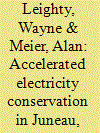|
|
|
Sort Order |
|
|
|
Items / Page
|
|
|
|
|
|
|
| Srl | Item |
| 1 |
ID:
104884


|
|
|
|
|
| Publication |
2011.
|
| Summary/Abstract |
An avalanche destroyed the main hydroelectric transmission line to Juneau, Alaska in April, 2008. Diesel-generated electricity was substituted, causing electricity prices to increase 500% for 45 days. Electricity demand fell by 25% during the supply disruption. Most of the reduction occurred before the higher rates were implemented. Some conservation - about 8% of historic consumption - persisted after the transmission line was repaired and prices returned to normal. Consumers reduced energy use through a combination of new habits and technical improvements. A survey of residential consumers indicated that the average household undertook 10 conservation actions, with major changes in lighting, space heating, fuel switching, and water and appliance use. We propose a method for prioritizing conservation actions for promotion according to their impact in electricity savings (as a function of popularity, effectiveness, and persistence) and a dynamic framework for electricity use before, during, and after a supply disruption (i.e., both the magnitude and rates of change in electricity conservation).
|
|
|
|
|
|
|
|
|
|
|
|
|
|
|
|
| 2 |
ID:
094911


|
|
|
|
|
| Publication |
2010.
|
| Summary/Abstract |
Local governments can have a large effect on carbon emissions through land use zoning, building codes, transport infrastructure investments, and support for transportation alternatives. This paper proposes a climate policy instrument - city carbon budgets - that provides a durable framework for local governments to reduce greenhouse gas emissions. Local governments would be assigned an emissions "budget", and would be required to keep annual local transport and buildings emissions within this budget. This policy framework could be implemented and managed by a higher-level government, or might be used in awarding funds to developing country cities from international climate funds. The state of California has enacted a version of this policy. In this paper, we identify and evaluate options for creating an effective and acceptable institutional structure, allocating emission targets to localities, measuring emissions, providing flexibility and incentives to local governments, and assuring compliance. We also discuss the likely costs of such a policy.
|
|
|
|
|
|
|
|
|
|
|
|
|
|
|
|
| 3 |
ID:
103396


|
|
|
|
|
| Publication |
2011.
|
| Summary/Abstract |
The Digital Television (DTV) Converter Box Coupon Program was administered by the U.S. government to subsidize purchases of digital-to-analog converter boxes, with up to two $40 coupons for each eligible household. In order to qualify as Coupon Eligible Converter Boxes (CECBs), these devices had to meet a number of minimum performance specifications, including energy efficiency standards. The Energy Star Program also established voluntary energy efficiency specifications that are more stringent than the CECB requirements. In this study, we measured the power and energy consumptions for a sample of 12 CECBs (including 6 Energy Star labeled models) in-use in homes and estimated aggregate energy savings produced by the energy efficiency policies. Based on the 35 million coupons redeemed through the end of the program, our analysis indicates that between 2500 and 3700 GWh per year are saved as a result of the energy efficiency policies implemented on digital-to-analog converter boxes. The energy savings generated are equivalent to the annual electricity use of 280,000 average US homes.
|
|
|
|
|
|
|
|
|
|
|
|
|
|
|
|
| 4 |
ID:
115653


|
|
|
|
|
| Publication |
2012.
|
| Summary/Abstract |
Energy related Principal-Agent (PA) problems cause inefficient combinations of investment, operating costs, and usage behavior. The complex market structure of the trucking industry contributes to split incentives because entities responsible for investments in energy efficiency do not always pay fuel costs and drivers are often not rewarded for fuel-efficient operation. Some contractual relationships exist in the trucking industry that hinder responses to fuel price signals. Up to 91% of total trucking fuel consumption in the U.S. is affected by "usage" PA problems, where the driver does not pay fuel costs and lacks incentive for fuel saving operation. Approximately 23% of trailers are exposed to an "efficiency problem" when owners of rented trailers do not pay fuel costs and therefore have little incentive to invest in efficiency upgrades such as improved trailer aerodynamics and reduced tire rolling resistance. This study shows that PA problems have the potential to significantly increase fuel consumption through avoided investments, insufficient maintenance, and fuel-wasting practices. Further research into the causes and effects of PA problems can shape policies to promote better alignment of costs and benefits, leading to reduced fuel use and carbon emissions.
|
|
|
|
|
|
|
|
|
|
|
|
|
|
|
|
|
|
|
|
|